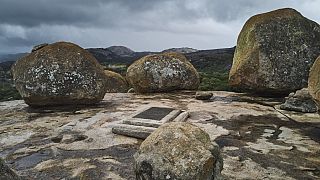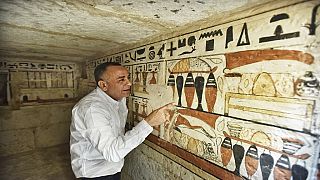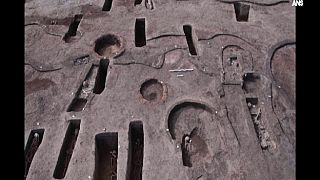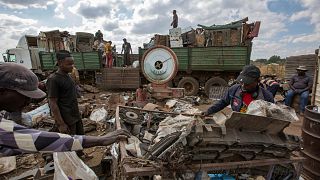Zimbabwe
Pick a portrait of yourself, have the picture hand-carved on a gravestone of your own design -- and pay for the monument before you die.
That is how a former banker in Zimbabwe, Tafadzwa Machokoto, found an unusual formula for making a hugely successful business.
Four years ago, the 35-year-old holder of a computer science degree quit a job with a leading bank, marching in the footsteps of many Zimbabweans who trek to neighbouring South Africa in search of a better life.
A year later, after a not-so-rosy stint, he returned to live in Rugare, a rundown district of the capital Harare where the big business is making tombstones.
Competition in the funeral sector is ferocious, and Machokoto had to win his spurs.
"We had to be innovative and that way we have managed to overtake many who were in the business before us," Machokoto said.
His idea: have artisans delicately chisel portraits of the dead on tombstones.
"We need to remember our loved ones not only by their name but also by their face," said Machokoto, flanked by a mason carving a portrait into black granite at a roadside yard.
He and business partner Brian Haruperi offer people options for designing their own tombstone, choosing a portrait they want, crafting the epitaph and paying for the service before they pass on.
Engraved portraits of the dead are a common sight in graveyards in Europe and elsewhere, though they are usually etched by laser.
For a similar idea to work in Zimbabwe, the pair had to pitch hand-crafted labour and overcome entrenched traditions and taboos.
It is typically the responsibility of the bereaved -- not the deceased -- to choose the monument.
But, Machokoto said, many people are swayed by the portrait -- and the idea of saving their loved-ones part of the funeral costs ahead of time.
Clients make a down payment of 50 percent, and pay 10 percent of the balance every subsequent month.
Lasting image
"A lot of people are in awe when they see" the portrait, Machokoto said.
One client is Jessica Magilazi, a 43-year-old Zimbabwean based in South Africa where is a domestic worker. She lost her mother when she was still an infant.
Her family had no picture of the mother except for the mugshot she had used in her passport.
They settled for that for the tombstone.
"When I look at the portrait it's like I am seeing my mother in real life," said Magilazi, who had travelled from Gqeberha (formerly Port Elizabeth) for the unveiling of the tombstone at her mother's grave in Highfield township.
"Those who will come after us will have an idea of how she looked," she said.
'I didn't learn art formally'
"I didn't learn art formally," said 19-year-old Denzel Karombe as he chiselled out a portrait from a black-and-white photograph.
He is one of many artists working for Machokoto's business Nyumba Yanga [Editor's Note: "My House" in the Malawian Chewa language, a nod to the Malawian railway workers who initially began the township.]
The artists are usually school-leavers in a township ravaged by unemployment and drugs, whom they train from scratch to carve and inscribe.
It sells 20 to 30 tombstones a month at an average price of US$350 -- a fortune in a country where the average monthly salary is around $230.
The most expensive tombstone Machokoto and Haruperi have sold is a US$5,000 "custom-made, dome-shaped, three-metre (10-feet) -long structure" ordered by a Zimbabwean diplomat for his late mother.
The business employs 12 full-time stoneworkers and several part timers, and attracts clients from across southern Africa and as far afield as Britain.













02:20
In Morocco, women keep the art of traditional rug-weaving alive
Go to video
Zimbabwe court rejects opposition bid to block Gukurahundi massacre hearings
02:19
South African actor Embeth Davidtz makes directorial debut with Rhodesia-set drama
Go to video
Families grapple with life in the wake of the Israel-Iran Conflict
01:39
Family of Kenyan man shot at close range by police demands accountability
01:10
Kenya's deputy police chief steps aside amid probe into blogger's death